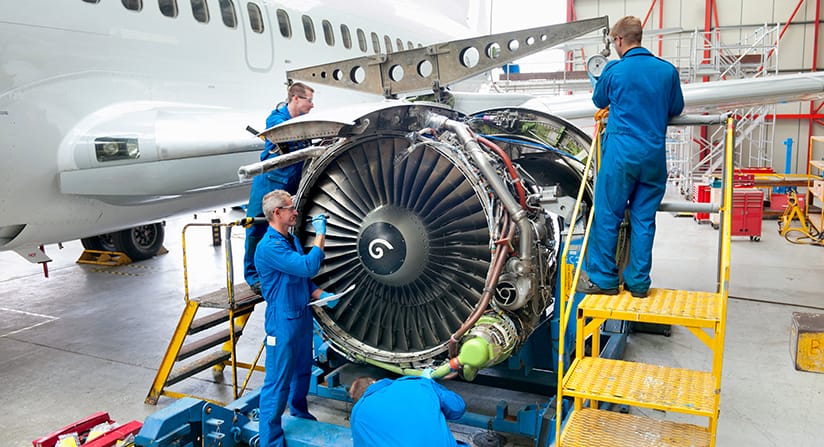The aerospace and defense manufacturing sector is evolving at a rapid pace. Precision, efficiency, and compliance are non-negotiable in this industry, and therefore, manufacturers should consider a manufacturing ERP solution that can handle all datasets and manage finance, production, quality, and all operations on one platform.
The primary challenges of aerospace and defense manufacturing remain constant. Supply chain issues, lack of visibility, not adhering to quality standards, and more. Manufacturing ERP systems combine siloed and fragmented data sets and optimize every operation and manufacturing process. Companies use ERP systems to increase production capacity, minimizing waste effectively, responding to market conditions, and meeting stringent quality requirements.
Let’s have a look at the standard modules of manufacturing ERP for aerospace and defense:
- Production Management
- Quality Management
- Inventory Management
- Advanced Planning and Scheduling
- Material Requirement Planning
- Purchasing
- Supply Chain Management
- Warehouse Management
- Shop Floor Execution System
- Estimation and more
Let’s see how these modules can help manufacturers streamline their business:
Table of Contents
Production Management
Production management is one of the core modules of Enterprise Resource Planning software for the aerospace and defense manufacturing industry. It allows plant floor workers to update their job status using hand-held devices like smartphones or tablets without leaving their workstations. Production Management functionality allows managers to create BOMs or issue change orders. It helps manufacturers optimize their resources, extract more profit, and reduce direct and indirect costs.
Quality Management
In the aerospace and defense manufacturing industry, quality is not just about compliance and regulations, but it is also about maintaining optimum safety standards and ensuring reliability for end users. Quality Management in manufacturing ERP software enables manufacturers to identify issues, resolve them, capture quality-control tests, inspect results, and comply with government regulations and industry standards.
Inventory Management
This module helps businesses reduce inventory carrying costs and eliminate stock outages. The benefits of inventory management include real-time visibility into safety stock, re-order points, and cycle counts. It ensures real-time status to what’s on order and the due date of the production order.
Inventory Management software keeps track of inventory levels, forecasts inventory requirements, and categorizes inventory by by highest consumption value, lowest consumption rate and interclass items.
Advanced Planning and Scheduling
Advanced Planning and Scheduling functionality helps manufacturers balance demand, capacity, and constraints in order to create achievable production schedules. APS helps plan capacity, generate, modify, and update production schedules, minimize changeover time, and respond intelligently to expected or unexpected changes in the production schedule.
Material Requirement Planning
From synchronizing the flow of materials to aligning it with the production schedule, MRP allows timely delivery of goods while ensuring lower inventory costs. MRP collects information from other ERP software modules and produces outcomes such as quantity requirements, run scenarios, etc.
Purchasing
Managing the entire procurement process, which may include purchase order creation and supplier invoice payment, is a crucial step in manufacturing. ERP helps aerospace and defense manufacturing companies simplify the complex order-to-pay cycle, including creating receipts, invoices, returns, and payments.
Supply Chain Management
A manufacturing ERP system provides digital tools to help manufacturers address challenges in managing multi-tiered supply chains. When you get visibility into every stage of the supply chain, it becomes easy to track resources and the status of the operation. With a dynamic, resilient, and efficient supply chain, manufacturers can accomplish their production tasks efficiently and ensure the timely delivery of goods.
Warehouse Management System (WMS)
The aerospace and defense manufacturing sector deals with sensitive and classified materials that need security features such as restricted access, audit trails, etc. The Warehouse Management System in manufacturing ERP ensures enhanced data security and demand forecasting. WMS manages product inventory shelf life, identifies non-conforming inventory, reduces unused inventory, lowers carrying costs, and automates picking, packing, order staging, and more.
Manufacturing ERP software plays a crucial role in streamlining operations by improving efficiency, reducing errors, and ensuring timely delivery of goods to customers. It also ensures traceability within the production stages. In aerospace and defense manufacturing, traceability is critical as it tracks the origin and history of components and materials.
A manufacturing ERP system helps address business challenges by streamlining the supply chain, offering robust financial modules, improving demand forecasting, protecting and securing sensitive data, etc.
Conclusion
Manufacturing ERP software is critical for aerospace and defense manufacturers as it helps maintain compliance records and ensures that the production process adheres to industry standards. ERP helps manufacturers track customer communication, offers project management capabilities, improves demand forecasting, manages inventory, and streamlines the overall operations of the manufacturing company.
A manufacturing ERP system monitors the supply chain in real time, improves efficiency by increasing turn times, and extracts more profit from each order by improving production efficiency and optimizing resources. As mentioned above, manufacturing ERP is embedded with multiple business modules such as Finance, Inventory, Supply Chain, Production, Quality Control, and more.
Subscribe below or explore the rest of the site for more business-related articles.

